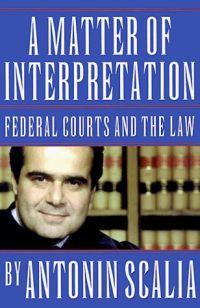

Purchase
This essay is followed by four commentaries by Professors Gordon Wood, Laurence Tribe, Mary Ann Glendon, and Ronald Dworkin, who engage Justice Scalia's ideas about judicial interpretation from varying standpoints.
Princeton University Press
July 1997
176 pages
ISBN: 0691004005
Trade Size (reprint)
Add to Wish List
Non-Fiction
We are all familiar with the image of the immensely clever
judge who discerns the best rule of common law for the case
at hand. According to U.S. Supreme Court Justice Antonin
Scalia, a judge like this can maneuver through earlier
cases to achieve the desired aim--"distinguishing one prior
case on his left, straight-arming another one on his right,
high-stepping away from another precedent about to tackle
him from the rear, until (bravo!) he reaches the goal--good
law." But is this common-law mindset, which is appropriate
in its place, suitable also in statutory and constitutional
interpretation? In a witty and trenchant essay, Justice
Scalia answers this question with a resounding negative. In exploring the neglected art of statutory interpretation,
Scalia urges that judges resist the temptation to use
legislative intention and legislative history. In his view,
it is incompatible with democratic government to allow the
meaning of a statute to be determined by what the judges
think the lawgivers meant rather than by what the
legislature actually promulgated. Eschewing the judicial
lawmaking that is the essence of common law, judges should
interpret statutes and regulations by focusing on the text
itself. Scalia then extends this principle to
constitutional law. He proposes that we abandon the notion
of an everchanging Constitution and pay attention to the
Constitution's original meaning. Although not subscribing
to the "strict constructionism" that would prevent applying
the Constitution to modern circumstances, Scalia
emphatically rejects the idea that judges can
properly "smuggle" in new rights or deny old rights by
using the Due Process Clause, for instance. In fact, such
judicial discretion might lead to the destruction of the
Bill of Rights if a majority of the judges ever wished to
reach that most undesirable of goals.
Comments
No comments posted.
Registered users may leave comments.
Log in or register now!
| 


 © 2003-2024 off-the-edge.net
all rights reserved Privacy Policy
© 2003-2024 off-the-edge.net
all rights reserved Privacy Policy